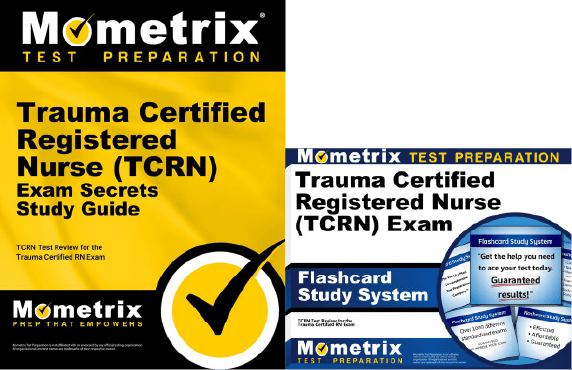If you need help studying for the Trauma Certified Registered Nurse (TCRN) exam or just want some more information about what the exam is like, you’ve come to the right place.
Click below to take a free TCRN practice exam!
Exam Eligibility
Before you can register to take the TCRN exam, you’ll need to ensure that you hold a current, unrestricted RN license in the US, Canada, or Australia.
Having two years of trauma nursing experience and 20 to 30 hours of trauma-specific coursework is recommended but not strictly required.
What’s on the Exam?
First, let’s talk about the questions on the TCRN exam. There are 175 multiple-choice questions total, but only 150 of the questions will count toward your score. Why is that?
The 25 unscored questions on the TCRN exam are called “pretest” questions. These are added to the exam to determine if they’re good enough questions to add to future versions of the test.
The trick is that you won’t have any way of knowing which questions are scored and which ones are pretest. They will appear just like the scored questions throughout the test.
The time limit for the exam is 3 hours. There aren’t any scheduled breaks, but you’re free to take restroom breaks as needed.
Let’s take a closer look at each section of the exam.
1. Clinical Practice: Head and Neck
33 scored questions
- Traumatic brain injuries
- Spinal cord injuries
- Facial fractures
- Ocular trauma
- Neck trauma
2. Clinical Practice: Trunk
37 scored questions
- Thoracic trauma
- Abdominal trauma
- Genitourinary trauma
- Obstetrical trauma
3. Clinical Practice: Extremity and Wound
25 scored questions
- Pelvic injuries
- Inhalation injuries
- Chemical burns
- Amputations
- Soft-tissue injuries
- Compartment syndrome
- Vertebral injuries
- Extremity fractures
- Thermal burns
- Electrical burns
4. Clinical Practice: Special Considerations
25 scored questions
- Psychosocial issues related to trauma
- Comorbidities
- Hemostatic resuscitation
- Complications
- Special needs
- Pediatrics
- Shock
- SIRS
- Victims of domestic abuse/child abuse/elder abuse and neglect
- Bariatric
- Substance use
- Victims of violence
- Patients with self-inflicted injuries
- Geriatrics
5. Continuum of Care for Trauma
15 scored questions
- Injury prevention
- Pre-hospital care
- Resuscitation
- Patient transfer
- Acute care
- Rehabilitation
- Discharge planning
- End-of-life issues
6. Professional Issues
15 scored questions
- Disaster management
- Trauma team well-being
- Education and outreach for interprofessional trauma teams and the public
- Ethical issues
- Trauma quality improvement
- Research
- Documentation
- Patient safety
- Advocacy
- Team dynamics
- Regulations and standards
How to Register
The first thing you’ll need to do is create a BCEN account via their website. Then, you can use this account to select “TCRN” as your certification and create a new application.
When you submit your application, you’ll also need to submit the exam fee (which can take up to 4 weeks to process, so be sure to give yourself plenty of buffer).
Once your payment is processed, you’ll receive an email from BCEN confirming your eligibility and giving you information about scheduling your exam date. You’ll have 90 days after your application is approved to schedule your testing appointment.
Exam Scores
The scoring method for the TCRN exam is a raw score directly based on your performance.
For example, if you get 115 questions right, your score will be 115. A passing score is a score of 108, so you must answer at least 72% of the questions correctly to pass.
You should receive your score report the day you complete the exam.
Retaking the Exam
In the unlikely event you fail the exam, you can retake it again! And again! And again! You can retake the TCRN as many times as you want. You must wait until at least 90 days after the initial testing date, and you may still need to pay to take it again, but you can retake it over and over again until you pass.
Here’s some good news: if your retest is within a year of your initial exam, you get a $180 discount!
FAQs
How many questions are on the TCRN certification exam?
The exam contains 175 questions.
What is the time limit for the TCRN certification exam?
The exam is timed at 3 hours.
What is the passing score for the TCRN certification exam?
You’ll need to answer at least 72% of the questions correctly to pass the exam.
How much does the TCRN certification exam cost?
The testing fee is $380.



 TCRN Study Guide
TCRN Study Guide TCRN Flashcards
TCRN Flashcards
